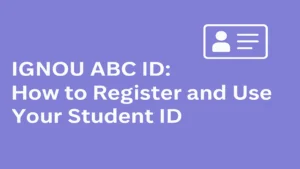Introduction
1. Overview of IGNOU and Its Examination System
IGNOU, or Indira Gandhi National Open University, was established in 1985 with the vision of democratizing higher education in India and abroad. As one of the largest open universities in the world, IGNOU offers flexible learning opportunities in various disciplines, including arts, sciences, business, education, and social work.
The university employs a distance education model, which allows students to study at their own pace and from their own location. The examination system is structured around Term End Examinations (TEE), held twice a year, with the June and December sessions being the primary examination periods. Along with these exams, students also undergo practical assessments and continuous assignments throughout their courses.
Understanding the exam system and question paper format is crucial, as it enables students to prepare strategically, maximize their chances of success, and manage their time effectively during the exams.
2. Importance of Understanding the IGNOU Question Paper Format
The IGNOU exam question paper format is designed to assess students on various levels of cognitive skills, from basic recall to analytical reasoning. Knowing the format ahead of time allows students to:
- Tailor their study techniques based on the types of questions they are likely to face.
- Efficiently manage time during the exam to avoid rushing through questions.
- Avoid common pitfalls like misinterpreting questions or overlooking key instructions.
Incorporating an understanding of the question paper structure into your preparation can significantly improve your chances of scoring well and reduce stress during the exam.
3. Purpose of This Guide
This guide serves as an essential resource for IGNOU students preparing for the June/December 2025 sessions. It aims to provide an in-depth understanding of the IGNOU question paper format, including the structure of the exam, the types of questions, marking schemes, and exam-taking strategies. With this knowledge, students can develop effective preparation plans and tackle the exam with confidence.
Understanding IGNOU Examinations
1. Types of Exams at IGNOU (TEE, Practical, Assignments)
At IGNOU, exams are categorized into three primary types: Term End Examinations (TEE), Practical Examinations, and Assignments.
- Term End Examinations (TEE): These are the traditional exams that most students are familiar with. They occur in June and December and test a student’s understanding of the entire syllabus. TEE exams are written exams and are typically held for 3 hours for most courses. These exams contribute significantly to a student’s final grade.
- Practical Examinations: For certain programs, such as those in science or engineering fields, practical exams are conducted to assess the application of theoretical knowledge. These exams are usually held at designated practical exam centers and focus on hands-on skills.
- Assignments: IGNOU places considerable emphasis on assignments, which are distributed throughout the semester. These assignments involve writing and submitting responses to questions based on the study materials provided. Assignments often account for a portion of the total grade in each course, making it important to submit them on time and with care.
2. Exam Frequency: June vs. December Sessions
As mentioned earlier, IGNOU holds its exams twice a year:
- The June session exams typically take place in the summer, usually from May to June, depending on the specific course schedule.
- The December session exams occur in the winter months, around November to December.
The timing of your exams depends on your enrollment cycle. Students who begin their courses in January typically sit for the June exams, while those starting in July will appear for the December exams.
3. How IGNOU Exams Are Structured (Theory, Practical, etc.)
The structure of IGNOU exams is designed to evaluate different aspects of a student’s learning:
- Theory exams (TEE) are typically 3 hours long and consist of multiple sections (MCQs, short answer, long answer questions).
- Practical exams focus on real-world application and technical skills. For example, students pursuing B.Sc. or BCA may need to demonstrate their ability to conduct experiments or write code.
- Assignments contribute to internal assessments. While these are usually written responses submitted online or offline, they can be time-consuming but are essential for continuous evaluation.
Understanding the structure of these exams helps students prepare accordingly and know what to expect on exam day.
The Structure of IGNOU Question Papers

1. General Layout of IGNOU Question Papers
The layout of an IGNOU question paper is standardized, ensuring consistency across various courses. Each paper typically includes:
- Instructions Section: This section outlines key information about the exam, including the total time allocated, the number of questions to be answered, and specific instructions (e.g., whether to attempt all questions or any specific section).
- Main Question Section: The main body of the paper, divided into various sections. Some sections may be compulsory, while others may allow students to choose between questions.
2. Distribution of Marks and Duration of Exams
The total marks for each IGNOU exam typically add up to 100 marks, which are divided across different sections of the question paper. For example:
- Objective Section (MCQs): 10-20 marks
- Short Answer Section: 30-40 marks
- Long Answer Section: 40-50 marks
The duration of the exam is typically 3 hours, though some practical exams may be shorter. Students need to plan their time wisely to ensure they have enough time to answer all the questions.
3. Sections of an IGNOU Question Paper: Objective, Descriptive, and Practical
- Objective Section (MCQs): This section consists of multiple-choice questions designed to test your recall and understanding of key concepts. These are the easiest to score if you have prepared well.
- Descriptive Section (Short Answer): Short-answer questions require concise explanations. They usually carry 2-5 marks each and test your understanding of core concepts, definitions, and brief descriptions.
- Long Answer Section (Essay-type): These questions require in-depth responses, and students are expected to write structured essays. They can range from 10-20 marks depending on the difficulty level. These questions test higher-order thinking, analysis, and the ability to organize ideas logically.
- Practical Section: For specific programs, you will be tested on practical skills such as performing experiments or analyzing case studies. This is more common for programs like B.Sc., BCA, or B.Ed.
4. Types of Questions You Can Expect: MCQs, Short Answer, Long Answer
- MCQs (Multiple Choice Questions): These questions are designed to test your ability to recall facts and concepts. They are generally straightforward but can be tricky if you don’t study thoroughly.
- Short Answer Questions: These are designed to test your knowledge and understanding of key concepts. They generally require 2-3 sentences or bullet points and focus on precise answers.
- Long Answer Questions: These questions typically require detailed answers. You should organize your response into paragraphs, with a clear introduction, body, and conclusion.
Detailed Breakdown of the June/December 2025 Question Paper Format
1. Format for Undergraduate Courses (BA, B.Com, B.Sc., etc.)
For undergraduate courses, the IGNOU exam question paper format is generally uniform, with a mix of MCQs, short-answer and long-answer questions. The number of questions can vary depending on the course, but typically:
- The MCQ section contains 10-20 questions, each worth 1 mark.
- The short-answer section usually contains 4-6 questions, each worth 2-5 marks.
- The long-answer section contains 3-5 questions, each worth 10 marks.
This structure helps students balance speed and accuracy when answering questions, ensuring that all aspects of the syllabus are covered.
2. Format for Postgraduate Courses (MA, M.Com, MSc, etc.)
For postgraduate courses, the questions are often more conceptual and analytical. You may find that:
- MCQs assess your recall of theoretical knowledge.
- Short-answer questions demand a deeper understanding of core topics.
- Long-answer questions involve in-depth analysis and critical thinking, often requiring students to apply their knowledge to real-world situations.
In postgraduate exams, students are expected to demonstrate a higher level of expertise in their subject area.
3. Format for Professional Courses (B.Ed, MBA, etc.)
Professional courses often involve a mix of theory and practical applications. For example:
- B.Ed exams may include case studies or lesson planning exercises, in addition to standard questions.
- MBA exams may include case study analysis or strategic planning exercises that require you to apply theoretical knowledge to practical business scenarios.
4. Important Updates for 2025: Changes in Paper Structure (if any)
In 2025, there are minimal changes in the overall question paper structure. However, IGNOU has emphasized more on case studies and problem-solving questions, especially for professional and postgraduate programs. This shift aims to encourage students to apply theoretical knowledge to practical situations.
Preparing for IGNOU Exams: Study Tips and Strategies
1. Time Management for Exam Preparation
Effective time management is essential for success in IGNOU exams. A well-organized study schedule will ensure that you cover all topics and leave enough time for revision. Break down the syllabus into manageable chunks, assign specific times for each section, and stick to your plan.
2. Key Topics to Focus on Based on the Question Paper Format
Review past question papers and identify topics that are frequently asked. Focus more on these areas while revising. For example, if certain chapters or topics appear regularly in past papers, give them extra attention.
3. Using IGNOU Study Materials Effectively
IGNOU provides comprehensive study materials, which are an excellent resource for exam preparation. These materials cover the entire syllabus and provide detailed explanations. Use them to reinforce your understanding and as a reference for writing answers.
Common Mistakes to Avoid During IGNOU Exams
1. Ignoring the Instructions on the Question Paper
One of the most common mistakes students make is failing to read the instructions carefully. The instructions on the question paper are crucial for understanding:
- The number of questions you need to answer.
- Whether you need to attempt all sections.
- The specific marks allocated for each question and section.
Many students rush into answering without reading the instructions, which can lead to wasted time or missed sections.
Pro Tip: Before you start answering, read through the instructions and the question paper as a whole. This will help you plan your approach.
2. Not Managing Time Properly
Time management is a key factor in performing well during the exams. Many students spend too much time on a single question or section, leaving them with insufficient time for other questions. It’s essential to keep track of time during the exam.
Pro Tip:
- Start with easier questions to build confidence.
- Allocate time for each section based on its marks. For example, spend more time on long-answer questions and less on short-answer questions.
3. Overloading Your Answer Sheet with Unnecessary Information
Many students try to impress examiners by writing more than necessary. While providing detailed answers is important, it’s equally crucial to stay on topic. Writing irrelevant information only consumes time and may confuse the examiner, resulting in fewer marks.
Pro Tip: Be concise. Stick to the core points and explain them clearly without adding unnecessary details.
4. Neglecting the Importance of Presentation
Even if your content is perfect, a poorly presented answer sheet can hurt your chances. A messy, disorganized answer sheet may make it difficult for the examiner to understand your answers, affecting your grade.
Pro Tip:
- Use bullet points for short answers.
- Write neatly, leaving a gap between answers.
- Use headings and subheadings for long-answer questions where appropriate.
IGNOU Question Papers: Best Practices
1. Analyzing Question Paper Patterns from Previous Sessions
Past papers are your best resource for understanding the types of questions you might face. By reviewing question papers from previous sessions, you can identify recurring themes and areas of focus. Many questions follow a pattern, which can help guide your preparation.
Pro Tip:
- Focus on topics that have been asked frequently in past years.
- Make a list of these recurring questions and practice answering them to improve speed and accuracy.
2. Identifying Key Topics and Prioritizing Your Study
Once you’ve analyzed past question papers, prioritize your study sessions based on frequently asked topics. This ensures you spend more time on important topics rather than equally distributing your time across less relevant areas.
Pro Tip: Create a study timetable where you allocate more hours to high-weightage topics.
3. Effective Answer Writing Techniques for IGNOU Exams
Your ability to write clear, concise, and relevant answers can make a significant difference in your exam performance. When tackling short-answer or long-answer questions:
- Start with an introduction summarizing your answer.
- Break the body into paragraphs, each covering a distinct idea.
- Conclude your answer with a summary or closing statement.
For MCQs, ensure you read each option carefully before selecting the answer. Don’t rush into marking the answer without analyzing all choices.
4. Handling Time Pressure During Exams
Time pressure can lead to panic, but it’s essential to stay calm. When you feel rushed, your performance suffers. If a question stumps you, skip it and move on to the next one. Come back to it once you’ve answered the easier questions.
Pro Tip:
- Keep an eye on the clock but don’t obsess over it.
- If stuck, attempt to answer the question in bullet points to save time.
How to Interpret the Marking Scheme
1. How IGNOU Assigns Marks for Objective vs. Descriptive Questions
The marking scheme for objective questions is straightforward—each correct answer gets 1 mark, while incorrect answers may not attract any negative marking (depending on the course). For descriptive questions, the marks vary:
- Short-answer questions carry 2-5 marks.
- Long-answer questions can carry anywhere from 10-15 marks.
Pro Tip: The more marks a question carries, the more detailed your answer should be. Use examples and explanations wherever necessary for long-answer questions.
2. The Weightage of Different Topics and Subjects
While the exam format is consistent, certain subjects or topics may have higher weightage. For example, some courses may focus more on theoretical concepts, while others may prioritize practical application.
Pro Tip: Identify high-weightage topics by reviewing past question papers and allocate more study time to them.
3. Understanding the Role of Internal Assessments
Internal assessments, including assignments and project work, are crucial components of the evaluation process. They contribute 30-40% to your overall grade, so they should not be ignored. Proper completion and timely submission of assignments can give you an edge in your final grade.
Pro Tip: Treat your assignments with the same seriousness as the final exam. Ensure they are submitted on time and are of high quality.
Tips for Writing the IGNOU Exam Answer Sheet
1. Writing Clear and Concise Answers
Clarity is key when answering exam question paper. Avoid vague or overly complex language. Aim for clear and concise answers that directly address the question. Use simple language, and stay focused on the topic at hand.
Pro Tip: Before writing your answer, take a few seconds to organize your thoughts in your mind. This will help you present your answer more clearly.
2. Importance of Following Word Limits for Long Answer Questions
Each long-answer question paper usually has a word limit. Sticking to this limit is important, as examiners often prefer brevity over over-explanation. Going beyond the word limit may lead to unnecessary information, which could detract from your main points.
Pro Tip: If a question specifies a word limit of 200 words, ensure that your answer is within that range. Use bullet points or numbered lists for efficiency.
3. Formatting Tips: Using Bullet Points, Headings, etc.
For short-answer questions, use bullet points to list key points. This helps break down the information and makes it easier for the examiner to read. For long-answer questions, using headings or subheadings can help structure your response and make it more organized.
Pro Tip: A well-organized answer sheet reflects your thought process and can lead to higher marks.
4. Common Mistakes to Avoid During the Exam
Some of the common mistakes that students make during exams include:
- Writing answers that lack focus.
- Failing to answer the question directly.
- Not adhering to the time limit for each question.
- Leaving questions incomplete.
Pro Tip: Review your answers at the end of the exam, and ensure each question has been addressed properly.
Common FAQs About IGNOU Question Paper Format
1. Are There Any Changes in the Format for 2025 Exams?
Although the general format remains the same, small updates or changes might occur. Always check official announcements from IGNOU for any modifications to the question paper format, especially for professional or newly introduced programs.
Pro Tip: Keep an eye on the official IGNOU website or your regional center for the latest exam updates.
2. How Do I Know If I Have Received the Correct Question Paper for My Course?
Each question paper will have the course code and course title clearly printed. It’s essential to check this before starting the exam. If there’s a mismatch, report it immediately to the exam invigilator.
Pro Tip: Take a moment to double-check your question paper and make sure it’s the correct one for your course.
3. What If I Don’t Understand a Question During the Exam?
If you encounter a question paper you don’t understand, it’s best to move on to the next one. Do not waste too much time trying to figure it out. Answer other questions first, and return to the difficult one if time permits.
Pro Tip: Focus on question paper you can answer confidently. This will help you score well even if you can’t answer every single question.
4. How Many Attempts Are Allowed for a Failed Question Paper?
If you fail a question paper, you can reappear for the exam in the next session (June or December). IGNOU allows multiple attempts, giving you a chance to retake and improve your performance.
Pro Tip: If you fail a paper, use the time before the next session to reassess your study plan and focus on weak areas.
Leveraging IGNOU Resources for Exam Preparation
1. IGNOU Study Materials: A Treasure Trove for Students
One of the most valuable resources for IGNOU students is the official study materials provided by the university. These materials are specifically designed to cover the entire syllabus and are often updated regularly to reflect the latest academic standards and trends. Ignoring these resources can significantly impact your performance.
Pro Tip: Start your exam preparation by reading through your study material thoroughly. Use it as your primary reference during revision sessions, especially for theoretical subjects where conceptual clarity is key.
2. Sample Question Papers: Practice Makes Perfect
To get a sense of the types of questions that may appear in the exam, students should practice sample question papers. These are available on the IGNOU official website or through academic portals that focus on IGNOU studies. Sample papers provide a realistic environment where students can test their knowledge and practice their time management skills.
Pro Tip: Complete at least 3-5 sample papers before the exams to get familiar with the exam format. Time yourself while taking these mock tests to improve your speed.
3. Online Resources and Study Groups
In the digital age, you have easy access to a wealth of online resources to aid in your exam preparation. There are numerous websites, online forums, and social media groups where students share tips, discuss topics, and help each other out with difficult subjects. Engaging with study groups on platforms like WhatsApp, Facebook, or dedicated Telegram channels can also help you stay updated on exam-related changes, tips, and strategies.
Pro Tip: Join online discussion forums to share your knowledge, ask questions, and get additional insights from fellow students or educators.
4. IGNOU Regional Centers: On-the-Ground Support
Apart from digital resources, your IGNOU regional center can provide valuable assistance in preparing for the exams. Many regional centers hold workshops, revision sessions, or even practice exam sessions to help students prepare. Reach out to your regional center to find out what support is available.
Pro Tip: Attend revision sessions or workshops organized by your regional center for focused guidance from experienced teachers.
Stress Management During IGNOU Exams
1. Managing Pre-Exam Stress
It’s normal to feel nervous or anxious before exams, but excessive stress can negatively affect your performance. If you feel overwhelmed:
- Practice relaxation techniques like deep breathing or mindfulness to calm your nerves.
- Take breaks while studying to prevent burnout.
- Maintain a balanced diet and get enough sleep to keep your mind sharp.
Pro Tip: Avoid cramming the night before the exam. Focus on revision instead, and get a good night’s sleep to be fully prepared.
2. Staying Calm During the Exam
During the exam, try to stay calm and avoid panic. If a question paper feels difficult, move on to the next one and come back to it later. Deep breathing and positive affirmations can help you focus and reduce exam anxiety.
Pro Tip: Use positive self-talk to boost your confidence. Remind yourself that you’ve prepared well, and trust your knowledge.
3. Post-Exam Reflection: What to Do After the Exam
After completing the exam, reflect on your performance but avoid obsessing over any mistakes you might have made. Focus on learning from any errors and applying those lessons to your future exams.
Pro Tip: Don’t let stress linger. After the exam, focus on your relaxation and preparation for the next session. Take some time for yourself to recharge.
The Role of IGNOU’s Grading System
1. How IGNOU Grades Its Students
IGNOU uses a grading system for its courses. The grades are awarded based on marks obtained in both the Term End Examinations (TEE) and the continuous assessment through assignments and practicals. The most common grading scale is as follows:
- A+ (Excellent): 80-100%
- A (Very Good): 60-79%
- B (Good): 50-59%
- C (Average): 40-49%
- D (Pass): 35-39%
- E (Fail): Below 35%
A good understanding of this grading scale can help students set realistic goals for their performance and stay motivated.
Pro Tip: Aim for a minimum grade of B to maintain a competitive standing. However, focusing on achieving an A or A+ will enhance your academic profile.
2. The Importance of Internal Marks in Your Final Result
Internal marks (from assignments and project work) contribute significantly to your overall grade. They can offset any shortcomings in your exam performance. As a result, these marks are an essential part of your preparation strategy.
Pro Tip: Treat your assignments with utmost seriousness. High-quality assignments can elevate your final grade, especially if you perform poorly in the exam.
3. Grade Card and Revaluation Process
After the exam results are declared, you will receive a grade card that reflects your overall performance. If you’re unsatisfied with your grades, IGNOU provides an option for revaluation of your exam papers.
Pro Tip: Review your grade card carefully. If you feel there’s an error or if you want a revaluation, apply for it as per the guidelines on the official website.
Conclusion: Your Path to Success in the IGNOU June/December 2025 Exams
1. Final Words of Encouragement
The IGNOU June/December 2025 exams are just one milestone in your educational journey. While the format might seem daunting, remember that with the right preparation, strategies, and mindset, you can excel. Use this guide to structure your approach, stay organized, and most importantly, stay confident.
Pro Tip: Believe in yourself and your ability to succeed. Consistent effort, combined with smart preparation, will lead you to success.
2. Actionable Takeaways
- Know the format: Familiarize yourself with the structure and types of questions.
- Start early: Begin your preparation well in advance to avoid last-minute stress.
- Use resources wisely: Take full advantage of IGNOU study materials, past papers, and online resources.
- Stay balanced: Manage your time, stress, and energy effectively for optimal performance.
As you begin your preparation, keep a positive mindset and remain focused on your goals. Good luck with your studies, and may you achieve all the success you desire in your IGNOU exams! 🌟
FAQs
What is the exam format for IGNOU June/December 2025 exams?
The IGNOU exam format typically consists of multiple-choice questions (MCQs), short-answer questions, and long-answer questions. The exam paper is designed to assess both theoretical knowledge and practical understanding of the subject. The number of questions and their distribution may vary depending on the course, but the structure remains largely consistent across different programs.
Pro Tip: Make sure to review your syllabus and past papers to get a clear idea of the types of questions that may appear.
How do I prepare effectively for IGNOU exams based on the question paper format?
To prepare effectively, you should:
Review past question papers: This will help you understand the types of questions frequently asked and their patterns.
Use IGNOU study materials: The study materials provided by IGNOU are comprehensive and directly aligned with the exam syllabus.
Focus on high-weightage topics: Prioritize the topics that are frequently tested in exams.
Practice time management: Complete mock tests or sample papers to simulate the exam environment and improve your time management skills.
Are there any changes to the question paper format for the June/December 2025 exams?
While the exam format typically remains consistent, it’s always a good idea to check for updates or announcements from IGNOU closer to the exam date. Changes to the format may occasionally occur, especially if new courses are introduced or if there are any major updates to the syllabus.
Pro Tip: Stay updated by regularly visiting the official IGNOU website or contacting your regional center for the latest information on the exam format.
Is there negative marking for incorrect answers in IGNOU exams?
No, IGNOU exams generally do not have negative marking for multiple-choice questions (MCQs). However, for subjective questions, incorrect or irrelevant answers may not fetch full marks, but there is no penalty for wrong answers.
Pro Tip: For MCQs, focus on selecting the correct answer, but don’t worry about losing marks for incorrect choices. For subjective questions, ensure your answers are relevant and concise.
How can I access sample papers and past question papers for IGNOU exam preparation?
You can find sample question papers and previous years’ question papers on the IGNOU official website. They are typically available for free download and serve as excellent resources for practicing and understanding the exam pattern. Additionally, many academic forums and study groups offer past papers and discussion sessions.
Pro Tip: Practice using these past question papers to identify frequently asked questions and familiarize yourself with the exam’s time constraints.
Related Posts:
- IGNOU Exam Pattern for MA in English: A Comprehensive Guide 2025
- Improve IGNOU Exam Result in 2025: Best Strategies, Tips & Tricks
- Ignou Certificate Courses for Career Growth 2025: The Best Guide
- How Long Does It Take to Update IGNOU Assignments Status: Best Guide 2025
- IGNOU Engineering Courses 2025: A Comprehensive Guide




